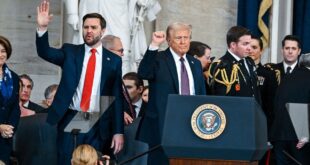
The state pension Triple Lock could be at risk after the man who introduced it admitted that its days are probably numbered.
The Triple Lock, introduced in 2011 by the then-coalition government, sees state pensions increased automatically each year by one of three metrics: the rate of inflation, the rate of wage growth or a flat 2.5%, whichever is highest.
This April, pensioners will get up to £470 more in their annual state pension payments thanks to the Triple Lock matching wage growth.
And this week, the Triple Lock was brought back into focus after Conservative leader Kemi Badenoch suggested that state pensions should be means tested in future.
Though the current Labour government has committed to the Triple Lock through to 2028, the former pensions minister who first brought in the Triple Lock system told BBC Radio 4 that it is not going to stay in place ‘indefinitely’ even though it is ‘still needed for now’.
Sir Stephen Webb told the Today programme: “I think there is a case for keeping it now, but not indefinitely.
“It was a formula that made sure every year when I was a minister I didn’t have to go and beg for George Osborne to give me a bit more money for the pension because there was a rule.
“We still have a pretty low state pension and pretty poor private pensions on top.” He suggested that when the state pension reaches a higher level, it might make sense to stop the triple lock, but for now, it is still needed.”
The Office for Budget Responsibility has previously identified the triple lock as a “fiscal risk”. This is due to its so called ‘ratcheting effect’, which leaves public finances exposed to higher pension costs.
The Institute for Fiscal Studies says that the triple lock makes planning the government’s finances difficult because the combination of its three components is difficult to forecast, as is the exact number of recipients with a full National Insurance record claiming the full state pension, and the number of years they will be claiming for.
Their current estimates for spending on the triple lock by 2050 range from £5 billion to £45 billion per year due to that uncertainty.
According to the House of Commons Library, The Organisation for Economic Co-operation and Development (OECD) has suggested that pensions should be uprated by an average of earnings growth and CPI inflation, alongside additional means-tested support for poorer pensioners.
Conservative Party co-chairman Nigel Huddleston defended Ms Badenoch on Friday, but asked by Times Radio whether the UK can afford the triple lock, Mr Huddleston said: “Over the long term these are exactly the things we’re looking at, but the Conservative Party has a long and proud history of supporting pensioners, this is the whole point.
Downing Street said on Friday that Prime Minister Sir Keir Starmer is “committed both to the triple lock and the principle of people receiving a state pension based on the contribution they have made over their lifetime, regardless of wealth”.
 Latest World Breaking News Online News Portal
Latest World Breaking News Online News Portal






